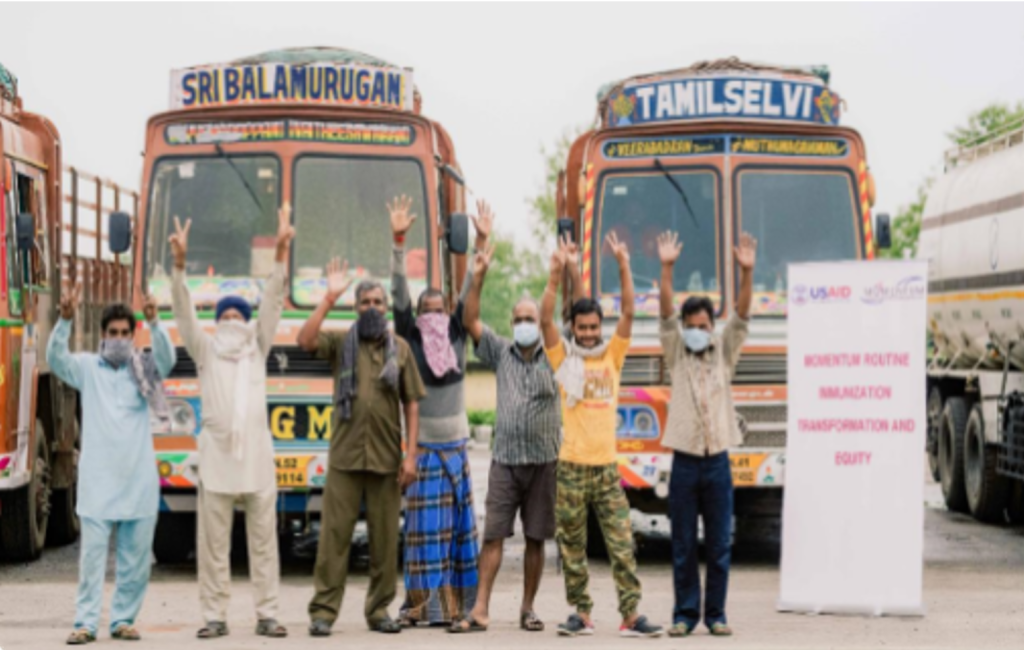From Kenya to India, Transportation Hubs Are Primed for COVID-19 Vaccines
Published on October 16, 2023
By Maggie Hurley, Program Officer, MOMENTUM Routine Immunization Transformation and Equity
Around the world, the transportation sector bridges the gaps between people, places, and goods. The COVID-19 pandemic demonstrated the world’s reliance on the transportation industry as sector workers and limited numbers of passengers continued to use transport hubs as the rest of the world came to a halt. Given their critical importance, transportation workers are a key population to protect against COVID-19 transmission.
USAID MOMENTUM Routine Immunization Transformation and Equity strengthens routine immunization programs and provides technical support for COVID-19 vaccinations. In Kenya and India, MOMENTUM uses transport hubs to increase access, share information, and ensure the safety of communities from COVID-19.
The Boda Boda Association of Kenya (BAK) is an umbrella organization for motorcycle operators and owners with chapters in all 47 counties of the Republic of Kenya and 800,000 members countrywide.[1] Boda bodas are motorcycle taxis that provide affordable and accessible transportation to passengers around the country. In Trans Nzoia County, MOMENTUM worked with the County Health Management Team (CHMT) to engage stakeholders representing BAK to enlist their support in advocating for COVID-19 immunization and bringing vaccination services to boda boda drivers.

The nature of BAK’s work means that its constituents are at high risk for contracting COVID-19 and are potential agents of widespread COVID-19 transmission, yet many motorcycle drivers expressed hesitancy in accepting the vaccine and difficulty in accessing service delivery points. Many boda boda drivers are under pressure to work without interruption to repay outstanding loans on their motorcycles. This dissuades drivers from taking the time to queue at health facilities to get vaccinated. MOMENTUM and the CHMT facilitated meetings with BAK representatives to plan and initiate outreach to boda boda sheds, where motorcycle drivers wait for customers, minimizing vaccination time constraints. During outreach, they hung promotional posters on motor bikes and vehicles at the vaccination site. Bringing vaccination services to the drivers not only generated demand for the COVID-19 vaccine but also enabled BAK leaders to debunk myths about the vaccine and improve acceptance and uptake among their peers.
“We realized that people are not showing up in the health facilities, so we started reaching out to them. We have been engaging special groups at the community level to assist us in driving uptake. The boda boda motorcyclists wield a lot of influence, especially in the community. We target them when it comes to engagement and ask them to get vaccinated and pass the message to their members,” explained Dr. Phillip Mbithi, Director of Preventive and Promotive Services in Trans Nzoia County Government.
In India, transportation workers experienced similar challenges to getting vaccinated against COVID-19 despite their vulnerability to contract and transmit the virus. The Transport Corporation of India Foundation (TCIF) employs close to 30 million people and serves more than 150 million,[1] yet many bus and truck drivers did not seek vaccination due to their busy work schedules.
Others could not obtain medical services because they were perceived as carriers of the virus. “Nobody would let us enter their offices or even come near us. People used to yell from afar commanding us to ‘stay away,’” said Sunil Singh, a truck driver with Transport Frontier Company.
TCIF leveraged its deep ties within the transport community to put vaccine concerns to rest and increase vaccine uptake across 18 states in India. Together with MOMENTUM, they identified stakeholders who are familiar with the unique characteristics of their communities to serve as Vaccination Champions.
Ravinder Singh, an employee at the Amritsar bus station in Punjab, is one Champion who worked to set up COVID-19 vaccination camps at the bus stand as a convenient location for drivers and passengers to get immunized.

“This is a very busy bus stand,” Ravinder explained. “People from across the state and outside the state come here. The drivers and the helpers of buses and trucks stop here for short breaks. The team offered on-the-spot registration and shared information about the vaccine. The TCIF volunteers tracked the drivers’ vaccination status to ensure they completed their series of doses.”
At the bus stand, Ravinder disseminated materials containing information about the importance, safety, and benefits of COVID-19 vaccination. The bus stand also played frequent messages over the public announcement system to create vaccine awareness and encourage uptake among drivers, conductors, bus stand staff, and passengers.

MOMENTUM’s work with BAK and TCIF shed light on two valuable lessons: First, taking immunization services closer to transportation staff through outreach at their facilities visibly improved acceptance and uptake. Second, partnerships with organizations and individuals that have existing relationships with the target population are critical to increase awareness, debunk myths, generate demand, and offer services that meet the needs of the population. From Kenya to India, these efforts protected countless transportation staff and their passengers against COVID-19 and emphasized the importance of involving the transport community in public health interventions.

